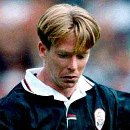 |
| Stephen McAnespie |

IN 1994 Stephen McAnespie performed heroics to win the Coca Cola Cup with Raith Rovers.
But little did the former right back know... the biggest challenge of his life was still to come.
In August last year, Steve was left clinging for his life to a rooftop in New Orleans following the devastation caused by Hurricane Katrina.
His home, his possessions, virtually his entire life was washed away in the floods that swept through the city. All his achievements in football paled into insignificance as Rovers' most expensive ever export sat trapped, his life in the balance, as water levels rose to within two feet of the rooftops.
For approaching 72 hours Steve clung desperately to the hope that he would be rescued, all the while having to peer at dead bodies floating in the water.
"When you go through something like that it changes everything," he told FifeNews. "It was something that I don't want to ever have to go through again. I was eventually airlifted out of there, but I lost everything."
What Steve didn't lose however was his reputation in the world of American soccer.
After losing his way in the UK game, he moved to America in 2003 to become player coach with Shell Shockers, and helped guide the team to the conference championship in their inaugural season. Following the hurricane, the club was temporarily out of business and after finding a new home in Atlanta, Steve was offered a job as head coach of the Indiana Invaders.
"This is my first manager's job and I'm really looking forward to it," he said. "I'm still only 33 and I have three years experience in coaching so I'm happy with the way things are going over here. "I could have stayed home, but I had the chance to come here and get ahead of the game.
"I've been given a great opportunity here and I'm even doing some stuff for the national team."
His first team responsibilities are just the tip of the iceberg as far as Steve's normal working day goes. He is on the training pitch from nine in the morning to, sometimes, nine at night working with the club's youth teams. This is a lesson he feels should be learned in Scotland.
"In my academy alone I've got 700 kids between the ages of eight and 18, and that's huge compared to back home," he said. "Youth development is at the forefront of everything over here, it's more important than the results. "I spend the whole day on the field with my youth teams, under 10s right through to the first team and they all come in at different times. "That's what annoys me about some of the coaches back home. "They come in for a couple of hours and then go home. They don't put the time and effort in that's needed to develop a club.
"If manager's are not putting the hours in on the training field then they are not doing their job properly."
While his League Cup winning exploits and subsequent European adventure at Raith are now firmly in his past, Steve rememebers his time in Kirkcaldy as fondly as you would expect. He picked up Player of the Year, Supporter's Player of the Year and Player's Player of the Year honours in his last full season. However, he left just one month before the club's most famous match against Bayern Munich as English giants Bolton payed a record £900,000 for his services in September 1995.
"My first love is Raith Rovers - that's where my heart belongs," Steve said. "I still have a daughter in Kirkcaldy and the Rovers' result is the first I look for on a Saturday night. "One of my friends sent over a DVD copy of the cup final recently. "I showed it to our youth players on the big screen at our complex all 700 of these American kids watched the game and couldn't believe it."
Steve's career started early – at the age of 15 – when the now-Manchester United manager Alex Ferguson signed him for Aberdeen. He enjoyed several seasons at Pittodrie before moving to Stockholm, Sweden to play for the Djurgarden IF when he was 21. Within a year he was back in Scotland and signed for Raith under Jimmy Nicholl at the start of the 1994-95 season. He went on to star in the most successful Rovers side in history, winning the Coca Cola Cup against Celtic at Ibrox and scoring a penalty in the shoot-out.
He made his record move to Bolton, and played 20 games in two years but he was sold to Fulham in 1997 for £100,000. He failed to make a mark and was loaned to Bradford before he was released in 2000.
Cambridge offered him a lifeline and he spent two seasons at the club before returning to Scotland to join Partick Thistle, although he never made a competitive start for the club. His next move would take him across the Atlantic, and he has been a player coach in the States for the past three years.
When quizzed about the possibility of a return to Scotland should the offer of a job in management come his way, Steve did not rule it out. "It's a great experience across here but if something worthwhile came up in Scotland then I would definitely look at it," he said.